Emotional Intelligence Assessment
The Emotional Intelligence Assessment is all about understanding and managing yourself and also understanding and managing others. It is based on an internal loop that begins with self-awareness of our own emotions and temperament. It continues through self-understanding and moves towards discipline and management of the self. It then repeats these steps by connecting to the emotions of others to build more effective relationships.
Emotional Intelligence Assessment
Research indicates that emotional intelligence, also known as emotional quotient (EQ), can be learned and seen as measurable differences directly associated with professional and personal success. Furthermore, it may be responsible for up to 80% of the success we experience in life. This assessment isn't an emotional intelligence test or quiz; it heightens awareness of our own EIQ, assesses relative strengths and weaknesses based on our emotional dispositions, and provides a framework for interpersonal and intrapersonal effectiveness.

Self-Recognition
Includes attitude, learning style, strengths and weaknesses, self-acceptance, authenticity, confidence, emotional well-being and self-perception
Social-Recognition
Includes thoughtfulness, rapport-building, connection, diversity, respect, kindness, and constructive interaction
Self-Management
Includes direction, purpose, emotional management, adaptability, taking initiative, goal-setting, resilience, and impulse control
Social-Management
Includes encouraging, supporting, collaborating, developing others, building friendships and partnerships, directing, and handling conflict effectively
Emotional Intelligence for
Professional Success
This assessment measures and provides insight into four components
of EIQ and the five sub-categories that contribute to each area:
Self-Awareness/Understanding; Cause & Effect; Self-Appreciation, Consciousness/Assertiveness; Emotional Identification
Social Recognition (SoR):
Empathy, Sensitivity, Appreciation; Service, Compassion, Benevolence; Holistic Communication; Situational Perceptual Awareness; Interpersonal Development
Self-Management (SeM):
Self-Control, Discipline; Goal-Directed Performance, Action; Integrity, Trustworthiness; Motivation, Positive Psychology; Creativity, Agility, Flexibility
Social Management (SoM):
Developing Relationships; Leadership & Influence; Change Catalyst & Response; Negotiation & Conflict Management; Teamwork & Collaboration
 A closer look at the 4 components of EIQ
A closer look at the 4 components of EIQ
Self Recognition
The ability to recognize, understand, and manage emotions is known as emotional intelligence. This skill involves being aware of your own feelings and how they affect your thoughts and actions. It also includes understanding the emotions of others and responding appropriately. People with strong emotional intelligence can handle stress and communicate effectively. They build better relationships and make informed decisions. This skill can be developed through practice and self-reflection. Improving emotional intelligence can lead to greater personal and professional success.
Social Recognition
Social recognition involves actively listening, observing nonverbal cues, and responding in ways that foster connection and trust. This skill is crucial in building strong relationships and effective communication. People with high emotional intelligence can understand how others feel and respond appropriately. They can manage their own emotions well, which helps them handle social situations effectively. This skill is especially important in teamwork and executive leadership roles, where understanding others can lead to better collaboration and conflict resolution. Developing emotional intelligence can improve personal and professional interactions, leading to a more positive environment.
Self Management
Regulating emotions, staying focused, and maintaining discipline are essential components of emotional intelligence. This skill involves managing impulses, adapting to change, and taking the initiative to achieve personal and professional goals. People with strong self-management navigate stress effectively, remain resilient in the face of challenges, and stay motivated. By setting clear goals and maintaining emotional control, they enhance their ability to lead, make sound decisions, and find fulfillment. Developing self-management fosters greater success, confidence, and personal growth.
Social Management
Strong relationships, collaboration, and effective social interactions are built on emotional intelligence. This skill includes guiding, supporting, and influencing others while managing conflicts constructively. Those with high social management skills create positive environments, encourage teamwork, and build meaningful connections. Whether in leadership, negotiation, or team settings, social management helps drive results and strengthen relationships. Improving this skill enhances communication, workplace dynamics, and overall effectiveness in both professional and personal interactions.

Trainer and facilitator materials
100% included
The world’s most comprehensive, one-stop assessment solution wouldn’t be complete without providing you with customizable coaching materials. EIQ has its own dedicated folder on member dashboards complete with multimedia materials, including PowerPoint slide decks, debrief guides, facilitator guides, group exercises, handouts, videos, and more!
Benefits of Emotional Intelligence
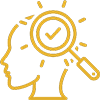
Self-Insight
EIQ helps you recognize your emotional foundation and see how it affects your thoughts and actions. Being self-aware allows you to discover your strengths and talents. For example, you might discover that you are good at problem-solving, creativity, or building strong relationships with colleagues.
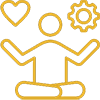
Stress Managment
Workplace stress is common and often indicates growth and pursuing new goals. However, it can also lead to negative behaviors and lower productivity. Emotional intelligence training and feedback can help with this. Employees with high emotional intelligence can manage their reactions to others' feelings, control their negative emotions, take responsibility for their actions, set realistic expectations, and build positive relationships. One clear advantage of emotional intelligence training is that it helps teams work better together under stress.

Improved Relationships
Emotional intelligence helps improve relationships at work. It allows people to understand each other's feelings better. This understanding leads to better leadership, communication, and fewer conflicts. Employees with high emotional intelligence are more confident and build trust and respect. They can collaborate more effectively with their teams. As a result, a positive work environment develops. Strong emotional ties can increase job satisfaction and productivity.

Empathy
Empathy is the ability to understand and share the feelings of others. This skill allows individuals to connect emotionally and respond to the needs of their colleagues. People with strong empathy can recognize when others are upset, frustrated, or need support. They can offer help and comfort in a way that builds trust and communication. Empathy contributes to better teamwork and fosters a supportive work environment. As a result of EIQ training, employees feel valued and understood, leading to increased morale and productivity.

Professional Growth
Emotional intelligence contributes to professional growth and competency. It helps individuals better understand themselves, allowing them to identify areas for improvement. People with high EIQ are more adaptable. They thrive in changing environments and handle challenges effectively. Positive relationships lead to better teamwork and collaboration. As emotional intelligence develops, so does career advancement. Employees can lead projects, inspire others, and drive results. This skill set is valuable for long-term success in any profession.


“The quality of the program stood out among the competition. They are really engaged in seeing you succeed in your business.”
Cameron Starnes,
Step 3 Consulting

“I enjoy the quality of assessments, ease of administering them, and their customer service. It is a great resource for my business.”
Lorraine Terry,
LivingByDesign

“The training, assessment offering, support, and customer service are all excellent. They are a great example of living life generously.”
Fiona Stevenson,
Fiona Stevenson
White label our DISC assessments with your brand's logo - Not ours!
Tools to power your business
Our 25 Years of R&D is now yours. Our white-labeled solution means more than just
branding — it means the freedom to run your business your way. Customize, market,
and
sell it however you want — including developing your own price points. Whether
you’re a
consultancy practice of one or 100, you have the freedom to leverage our
industry-leading assessments, resources, and technology to be your own. We have
partnered with thousands of coaches and consultants around the globe to help grow their
businesses.
The leading corporate assessment solution
Are you an in-house corporate trainer or an HR professional? For businesses, this means
developing in-house employee training curriculums without compromise. It also means
employing assessments during the hiring & selection process, complete with your
branding, to further promote your organization’s identity and culture. Companies around
the world leverage our assessments to hire smarter, accelerate sales, solve conflicts,
and more. Whether you are a small start-up or a Fortune 500 company, we have tailored
corporate solutions to fit your needs.
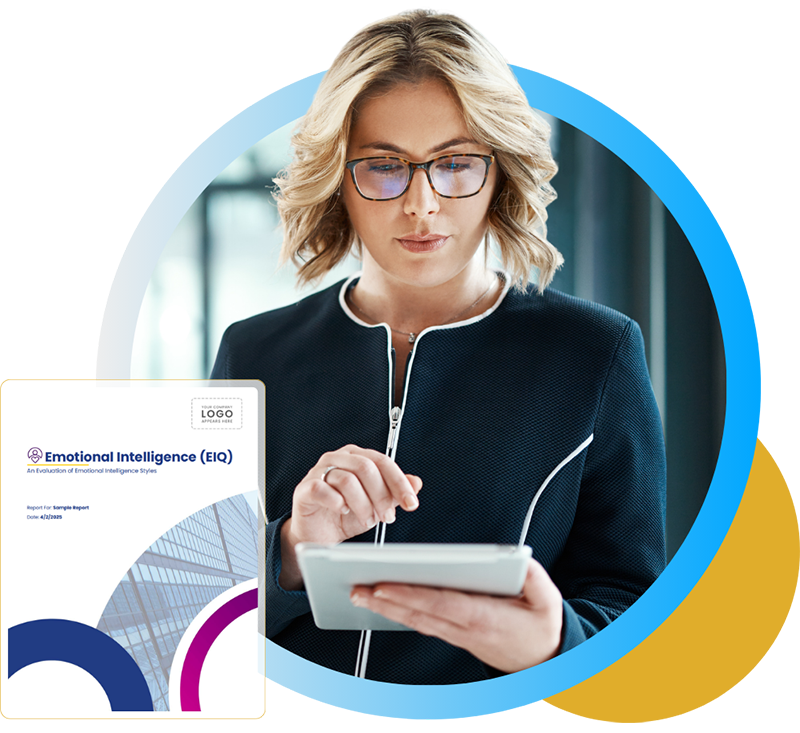
Quick to complete
With an average completion time of 12-15 minutes, every assessment questionnaire is delivered by email link, subsequently generating a PDF report that is automatically uploaded to the member’s white-label dashboard.
Available languages
Our internationally accredited EIQ assessments are currently available in multiple languages. See our sample reports page for the list of available languages and to view sample results.
Emotional Intelligence 360°
The EIQ 360º offers assessment professionals and users alike the ability to compare the user’s perceived “self” emotional intelligence in contrast with the “observer” feedback provided anonymously by colleagues, direct reports, managers, etc. Learn more about our Emotional Intelligence 360°.
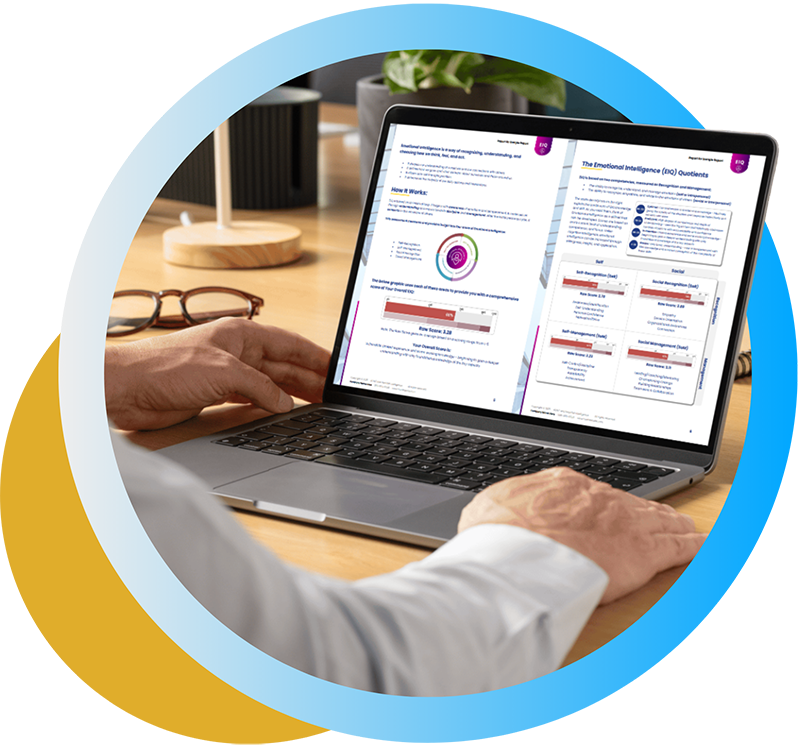
Choosing Assessment 24x7's
Emotional Intelligence Assessment
Choosing Assessment 24x7's Emotional Intelligence Assessment provides many advantages. The assessment delivers clear insights into your emotional intelligence. It helps identify strengths and areas that need improvement. This information is valuable for social awareness and personal and professional growth. The program is easy to understand and accessible. You will receive support materials to help you use the assessment results effectively. Additionally, EIQ Certification opens doors to new opportunities in your career. You can connect with others in the field and expand your strategies and professional network.
Get EIQ Certified
Become an expert with our internationally accredited certification training. Designed
specifically to foster a deeper understanding of the model, you’ll discover how it can be
used to build more effective personal and professional relationships. Through one-on-one EIQ
training with instructor-led sessions and self-study, you will learn to use the assessment
results with supportive, comprehensive resources that are available when you need them. As a
bonus, if you are certified in multiple assessments, your instructor will show you how to
combine the assessment's technical results for a holistic understanding of how they work
together.
Each certification program includes additional benefits, such as exclusive access to our
Certified Trainer Materials library, discounted pricing, continuing education credits, 10
complimentary assessments when you finish the program, and a listing on our International
Directory of Practitioners.
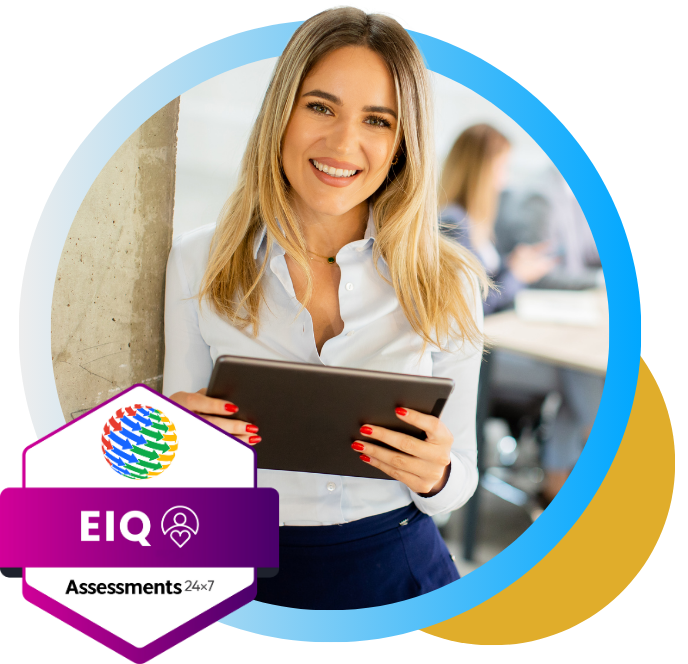
 12 Credits
12 Credits SHRM**
 12 Credits
12 Credits HRCI*
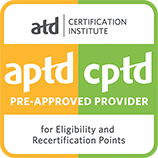 12 Credits
12 Credits ATD
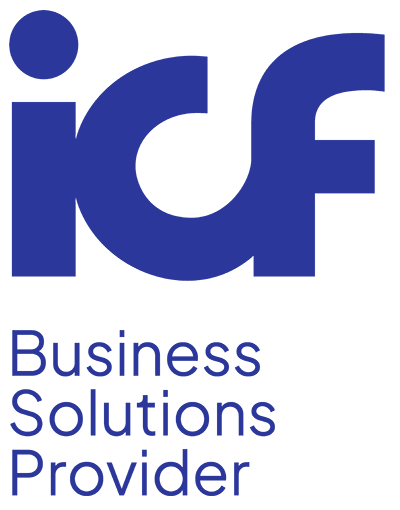 8.25CC/6.75RD Credits
8.25CC/6.75RD Credits ICF
Frequently Asked Questions
Where is the best place to start with EIQ?
It’s always best to begin with the self. Self-Recognition is the foundation of Self-Management
because if we don’t understand it, how can it be managed? Social awareness and building strong
relationships with others spring from our understanding of self. All four of the quotients are
interrelated and will impact each other. Therefore, if Self-Recognition is strong, we are more
likely to appropriately understand and interact with others.
Is EIQ really effective to use in the workplace?
Absolutely! For some it may seem “touchy-feely” or “too emotional,” but EIQ goes far beyond just
the soft-skill applications. High EIQ benefits our communication, decision-making, strategy,
leadership abilities, sales, teamwork and team performance, productivity, relationship
satisfaction, customer service, conflict management, and overall effectiveness! Who wouldn’t
want that at work?
What’s the best model of EIQ? I see some differences with other
vendors.
There are a few different reputable models of EIQ out there, and you may find that some speak to
you and your needs (personally or professionally) in ways that others may not. We encourage you
to explore the options available and really dive into the details and application of the report
before you make a judgment about how it will work for you. What seems simple and easy on the
surface can uncover a wealth of knowledge and powerful learning opportunities that impact how we
understand and manage our emotions and relate to the emotions of others in a way that works.
(P.S. We’re pretty sure ours is best!) See a sample report.
How can I use Emotional Intelligence with my team?
Teams built with high EIQ measures are likely to be the most effective! While it isn’t always
easy to collaborate with different people, if we can learn to use our EIQ skills, we can look at
problems and find solutions in ways we couldn’t from the same paradigm of thought. By
understanding ourselves and others, we can use EIQ to heighten personal performance, empower
relationships, and direct teamwork in a more results-oriented manner while striving to ensure
everyone on the team gets what they need to be successful and satisfied. Working together is the
objective and becomes the playing field to demonstrate the building blocks necessary for
high-performing teams.
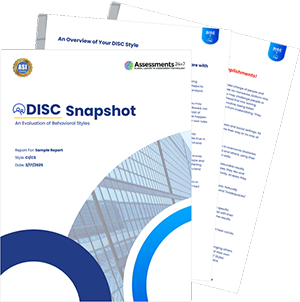
 +1 (206)
400-6647
+1 (206)
400-6647




 sales@assessments24x7.com
sales@assessments24x7.com